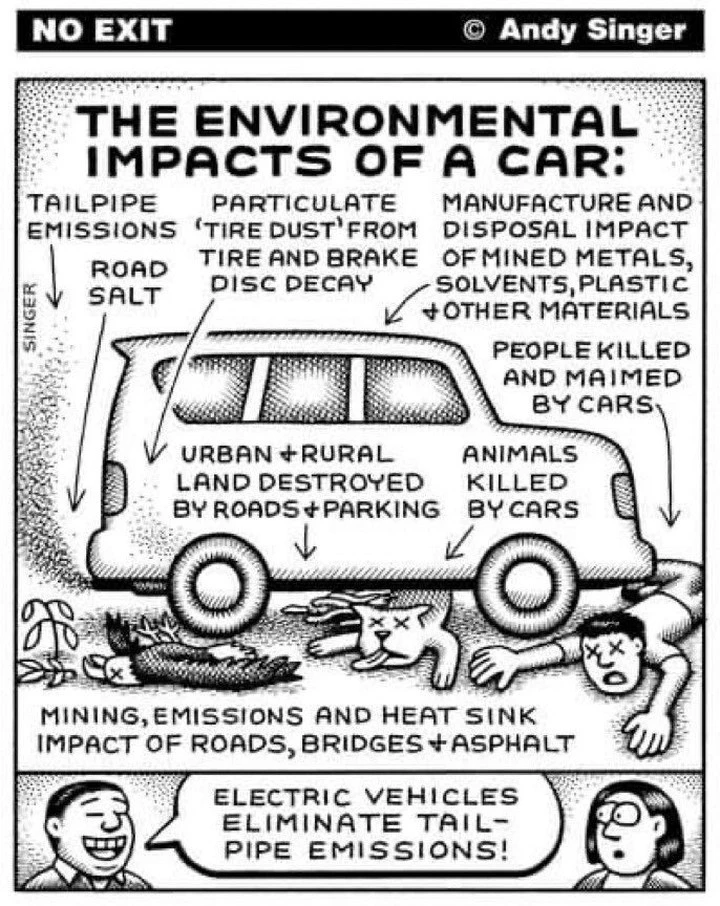I want a network of 500,000 light rail stops.
But Pete buttigieg and his friends at McKenzie said that’s just not possible in the US
Why not both?!
i want 1,000,000
EV’s and all cars are a dead-end technology. They serve the auto industry and don’t help much else. We need more trains and eBikes.
Are e-bikes not EV’s? I agree, trains would be good too but this is still a step in the right direction.
Wish I knew what made you soo bitter about EVs. (Bad experience with a short-range used one?) My impression is that they’re an ok part of what we need, along with a large cut in driving of the sort you talk about.
Maybe this…

Maybe it was the lithium coup. Maybe it’s the fact that the infrastructure required is impossible to build and far more expensive than a functional rail network… Like the one that was deployed in the US prior to AAA tearing up most of the lines. I dunno, maybe it’s an understanding of the concept of “induced demand” or maybe it’s the problem of density that makes car centric society unsustainable and a concern about the suburban ponzi scheme. Maybe it’s the fact that the choice of where to build highways and which neighborhoods to bulldoze was explicitly racist. Maybe they just saw a picture of Huston once. Maybe it’s the increasing numbers of pedestrian deaths and the fact that kids basically aren’t safe biking outside in the US and Canada. It could be the fact that the higher weight of EVs make them significantly more dangerous for pedestrians, cyclist, and even other drivers.
I dunno, lots of reasons to think cars are fucking shit and EVs are included.
Cars are absolutely not the solution. The solution would remove cars from the road because every single person carrying several tons of metal with them isn’t efficient. The problem is that the solution would negatively impact the oil industry. Instead we’re being sold a false soliton, just like when they tried to sell us Hydrogen fuel cell cars so that they could get another decade before coming up with another scam.
We’ve been exactly here before. This is exactly the same scam as the last time. It cost is a decade, and people are buying this hoax exactly like the last one.
https://www.thenewatlantis.com/publications/the-hydrogen-hoax
Well, traveling east-west through PA takes longer than you think it will, and nobody wants to spend any more time in Ohio than they absolutely have to. I think these states are good places to start. :)
Ohio on a roll lately!
Chargers arent really an issue. Not sure why this is consistently the focus.
Grid level battery storage is what we need. The cars can a day between charging. Charge them at home. But we effectively need to long term reduce the environmental impacts of electricity to 0. We need grid level storage to do so.
I’ve been driving an electric for 3 years. I maybe charge outside of the house (slow, trickle charge overnight) 12x a year. Its just not neccessary.
Public chargers have two huge advantages:
- They provide someplace for people living in rental housing to charge
- They enable road trips
The result of building them will be to shift some amount of transport away from burning fossil fuels.
by public, you mean like a gas station? a private business that serves the public
or do you mean public like the interstate system is public? a public service funded by taxes
More like gas stations and toll roads. They’re not providing free-as-in-beer electricity
These are both edge cases and shouldn’t be the focus of policy. Straight up. Its a complete mistake to prioritize these as investments.
We have a grid, the VAST majority of electric car owners have access to outlets, we should be focusing on grid level storage, not charging networks.
A third of Americans rent their home, that’s not an edge case.
Renting a home means you have access to a wall socket.
Yes, those are edge cases.
You’re out of touch, not just with where we are, but where we need to be.
Adding to charging networks is a waste of resources. We need battery storage at grid level. It’s more important and a higher priority.
Not everyone just drives a bit and returns home each day.
What percentage don’t?
More than 0%, therefore DC fast chargers are needed.
this is true and it’s a fact that most people do just drive a bit and return home each day
When it comes to building DC chargers, the relevant question is “does anybody ever drive more than 100 miles from home in this area?”
Even if 99% of your trips are near home, you still need DC chargers for the rest.
Maybe I’m out of the loop! Figured they’d phase it in. Something like:
- 1 transition fleets - buses, local delivery
- 2 people commuting in town to and from work on the daily
- 3 long haul interstate trucking
When the plan is everyone gets 100% coverage, you’re absolutely right. We’ll need chargers every 50 miles
Having a broad charger system would facilitate commercial electric transport which is where the biggest gains can be made in terms of reducing car climate impact.
Agree, but that’s a very very very different kind of network than what we’re talking about.
I’m too lazy to find the info for myself, can anyone please eli5 why they can’t build them to recharge themselves?
The energy has to come from somewhere. A cord with a meter saying how much you used is a pretty easy way to do it.







